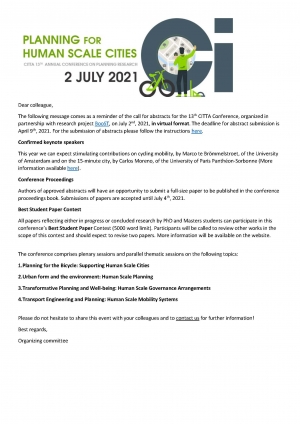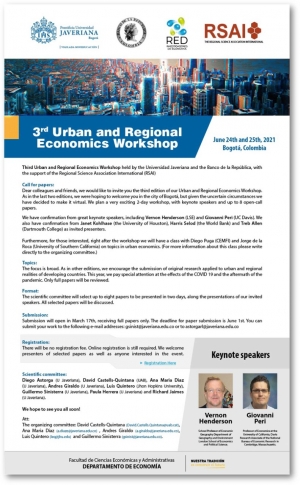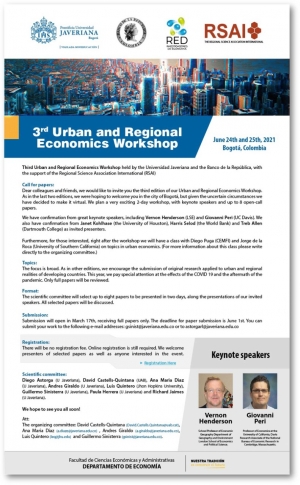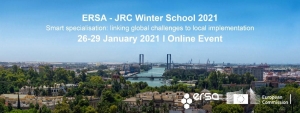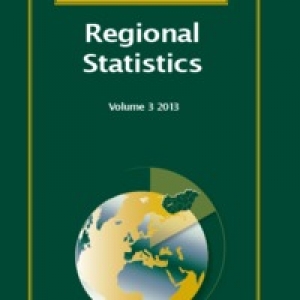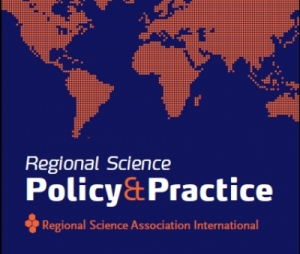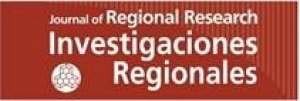Peter Nijkamp Research Award
Elisabete Martins
Executive Director of Bloustein School of Planning and Public Policy Informatics Program and Non-Tenure Track Associate Professor or Professor of Practice
The Bloustein School of Planning and Public Policy in Rutgers University, New Brunswick, invites applications for the position of Executive Director of Urban and Public Policy Analytics and Health Informatics Program. This is a full-time non-tenured Associate Professor or Professor of Practice position in the School, for a period of three years, with the possibility of renewal, subject to availability of funding. Applicants with significant professional experience are encouraged to apply.
Rutgers New Brunswick is a Big 10 university and a member of AAU. The school has several highly ranked programs in the areas of city and regional planning, public policy, health administration, undergraduate public health, and related areas. A new academic area is Public Informatics, with a current focus on Urban Planning and Public Policy, and a degree focus on Urban Analytics, but with plans to expand to new areas over the next few years.
Our research centers are focused on transportation, workforce development, the built and natural environments, urban and civic informatics, survey research, and other areas. The school also has cross-cutting research clusters on Upstream Determinants of Health https://bloustein.rutgers.edu/centers/health-at-bloustein/ and the Future of Cities, Society, Work and Health. https://bloustein.rutgers.edu/centers/smart-civic-tech/
We seek to appoint a senior practitioner who will administer our current programs in the Informatics area, including the Master of Public Informatics, a Graduate Certificate in Urban and Public Informatics, and a soon-to-be offered online Master of Public Informatics, and to recruit students into and grow those programs. We further expect that working with other faculty, and instructional technology developers, the successful candidate will establish new academic programs, including online programs, certificate programs that are targeted to mid career professionals, as well as programs in new areas of specialization. Based on our Strategic Plan, expected areas of growth include Health Analytics and Public Policy Analytics, and related areas.
The candidate will teach graduate-level courses on some of the following topics: data science, machine learning, GIScience, and other analytics; programming; optimization techniques; network analysis; domain-specific technology and tools-oriented courses; project management; technology strategy; and support student projects and independent learning. The ideal candidate will extend the school’s already extensive government and industry engagement in the technology and analytics space, and will establish student internship and research programs in these areas.
All information at: https://jobs.rutgers.edu/postings/129020
REMINDER I CITTA 2021 - CALL FOR ABSTRACTS - 13th Annual Conference on Planning Research – ‘Planning for Human Scale Cities'
Dear colleague,
The following message comes as a reminder of the call for abstracts for the 13th CITTA Conference, organized in partnership with research project BooST, on July 2nd, 2021, in virtual format. The deadline for abstract submission is April 9th, 2021. For the submission of abstracts please follow the instructions here.
Confirmed keynote speakers
This year we can expect stimulating contributions on cycling mobility, by Marco te Brömmelstroet, of the University of Amsterdam and on the 15-minute city, by Carlos Moreno, of the University of Paris Panthéon-Sorbonne (More information available here).
Conference Proceedings
Authors of approved abstracts will have an opportunity to submit a full-size paper to be published in the conference proceedings book. Submissions of papers are accepted until July 4th, 2021.
Best Student Paper Contest
All papers reflecting either in progress or concluded research by PhD and Masters students can participate in this conference’s Best Student Paper Contest (5000 word limit). Participants will be called to review other works in the scope of this contest and should expect to revise two papers. More information will be available on the website.
The conference comprises plenary sessions and parallel thematic sessions on the following topics:
1.Planning for the Bicycle: Supporting Human Scale Cities
2.Urban form and the environment: Human Scale Planning
3.Transformative Planning and Well-being: Human Scale Governance Arrangements
4.Transport Engineering and Planning: Human Scale Mobility Systems
Please do not hesitate to share this event with your colleagues and to contact us for further information!
Best regards,
Organizing committee
http://citta.fe.up.pt/
CITTA I Centro de Investigação do Território Transportes e Ambiente
FEUP I Faculty of engineering of the University of Porto
DEC I Department of Civil Engineering
Call for Papers | 3rd Urban and Regional Economic Workshop, 24-25 June 2021, Bogotá, Colombia
Call for Papers | 3rd Urban and Regional Economic Workshop, 24-25 June 2021, Bogotá, Colombia
ERSA-JRC Winter School 2021: Extended Application deadline until 25 November
Call for Application extended until 25 November!
Are you a smart young researcher* looking for state-of-the art knowledge around the topic of #smartspecialisation, willing to present your research and get precious feedback from outstanding professors and experts.
> Don't miss out this last chance > Apply now!
*Doctoral and Postdoctoral students as well as junior researchers with less than 5 years of experience.
Lecturers and Lab Sessions Update
Confirmed lectures:
|
The laboratory Sessions Update will feature:
· Tools and data for Smart Specialisation
· Evidence from S3 implementation and monitoring
· Smart Specialisation for Sustainable Development Goals
>>> Stay tuned: More updates to be posted shortly on the Winter School website
ERSA-JRC Winter School 2021 jointly organised with the Joint Research Centre of the European Commission (Seville) and in partnership with the ERSA Spanish Section AECR

Follow us and join the conversation on #ERSAWinterSchool #smartspecialisation
Call for Papers and Special Session Proposals | 28th APDR Congress | 16-17 September 2021, UTAD, Vila Real, Portugal
Call for Papers and Special Session Proposals
The APDR invite regional scientists, economists, economic geographers, urban planners, policy makers, and researchers of related disciplines to participate in the 28th APDR Congress that will be held from 16 to 17 of September, 2021, University of Trás-os-Montes e Alto Douro (UTAD), placed in Vila Real, in the Northeast of Portugal
Beyond the various themes related to regional science this congress will focus on the emerging topic of Green and inclusive transitions in Southern European regions: What can we do better?.
The call for papers and Special Session Proposals are open and your participation is very welcome!
Themes of specific interest are:
- RS01 - Smart Sustainable Development
- RS02 - New Urban Agenda and Sustainable Development Goals
- RS03 - Circular Economy at Regional, National and International Level
- RS04 - Spatial Aspects of the Green Deal
- RS05 - Energy, Transports and Mobility, Agri-food and other Systemic Transitions
- RS06 - Climate Change Mitigation and Adaptation
- RS07 - Spatial Allocation of Public Goods and Services
- RS08 - Migration, Integration, Growth and Welfare
- RS09 - Regional Resilience and Crisis
- RS10 - Theory, Qualitative and Mixed-Methods in Regional Science
- RS11 - Natural Environment and Urban Development
- RS12 - Natural Environment and Rural Development
- RS13 - Low-Density Regions and Development
- RS14 - Territorial Cohesion and Asymmetries
- RS15 - Innovation, Entrepreneurship and Regional Development
- RS16 - Quality of life, Wellbeing and Happiness
- RS17 - Tourism, Sports and Regional Development
- RS18 - Big and Available Data for Regional Science
- RS19 - Geographic Information Systems and Location Modelling
- RS20 - Systemic Analysis of Transport and Communication Networks
- RS21 - Operational Models for Cities and Regions
- RS22 - Spatial Econometrics
- RS23 - Ecological Economics and Ecosystems Services approaches and methods
Deadline for Special Session proposals: June 14, 2021. Proposals should be sent by email to the secretariat of the Congress (This email address is being protected from spambots. You need JavaScript enabled to view it.).
Deadline for Abstracts submissions: July 5, 2021. Authors should submit their abstracts through online submission system by following the link https://cmt3.research.microsoft.com/APDR2021.
All information at the congress website: http://www.apdr.pt/congresso/2021
Looking forward to meeting you in Vila Real!
The Organizing Committee and the Board of APDR 28th APDR Congress
New Post-doctoral Fellow/Research Associate | Division of Public Policy
The Division of Public Policy (PPOL) seeks to recruit a new Post-doctoral Fellow/Research Associate with specialty in the broad areas of urban policy, including transportation, land use, economic development, housing, and social equity. Main tasks of the appointee include conducting research on a wide range of urban topics which will be determined by the faculty supervisor, assisting in supervising PhD and Master students in the team, and developing his/her own research agenda.
Applicants should have a recognized PhD degree in relevant discipline, including but not limited to, transportation engineering, urban planning, urban studies, regional science, geography, urban economics, and public policy. The successful applicant is expected to have strong analytical skills, sense of responsibility, responsiveness to fast-paced research environment, and excellent independent research ability. The candidate must have been well trained in quantitative research methodologies such as statistical analysis, big data analytics, machine learning and/or GIS. Familiarity with qualitative research methods is a plus. Interested candidates are encouraged to apply as soon as possible. (Duration: 1 year, with a possibility of 1-year renewal subject to performance and funding)
Salary is highly competitive and will be commensurate with qualifications and experience. Fringe benefits include annual leave, medical and dental benefits. Contract renewal will be subject to performance, funding availability and mutual agreement.
Please complete an online application form through the HKUST Careers website (https://hkustcareers.ust.hk) and return it online together with (a) a curriculum vitae; (b) a letter of intent describing their motivation, qualifications, skills and experience relevant to this position; (c) 2-5 writing samples (e.g., working papers, journal publications); and (d) 2-3 reference letters to the Human Resources Office on or before Friday, 16 April 2021.
For enquiries, please contact Dr. Pengyu ZHU (This email address is being protected from spambots. You need JavaScript enabled to view it.).
You can view and apply for this job at:
The New Issue of Regional Statistics is already Available! (2021, VOL 11, No 2)
THE NEW ISSUE OF REGIONAL STATISTICS IS ALREADY AVAILABLE!
We are pleased to inform you that a new issue of the Regional Statistics has been released and now it’s avaiable online.
http://www.ksh.hu/terstat_eng_current_issue
REGIONAL STATISTICS, 2021, VOL 11, No 2.
STUDIES
Tamás Sebestyén − Erik Braun − Zita Iloskics − Attila Varga: Spatial and institutional dimensions of research collaboration: a multidimensional profiling of European regions
http://www.ksh.hu/statszemle_archive/regstat/2021/2021_02/rs110203.pdf
George Petrakos − Konstantinos Rontos − Chara Vavoura − Luca Salvati − Ioannis Vavouras: Political budget cycles and effects of the excessive deficit procedure: The case of Greece
http://www.ksh.hu/statszemle_archive/regstat/2021/2021_02/rs110202.pdf
Kamran Jafarpour Ghalehteimouri − Ali Shamaei − Faizah Binti Che Ros: Effectiveness of spatial justice in sustainable development and classification of sustainability in Tehran province
http://www.ksh.hu/statszemle_archive/regstat/2021/2021_02/rs110201.pdf
Foued Ben said: Recent tendency in Tunisian industrial firms’ location
http://www.ksh.hu/statszemle_archive/regstat/2021/2021_02/rs110204.pdf
Sruthi Krishnan V − Mohammed Firoz C: Impact of land use and land cover change on the environmental quality of a region: A case of Ernakulam district in Kerala, India
http://www.ksh.hu/statszemle_archive/regstat/2021/2021_02/rs110205.pdf
László Kökény − Kornélia Kiss: There is a time and a place for everything (and for everyone): Examining main socio-demographic and territorial differences in use of leisure time
http://www.ksh.hu/statszemle_archive/regstat/2021/2021_02/rs110206.pdf
Imre Dobos − Gábor Michalkó − Péter Sasvári: The publication performance of Hungarian economics and management researchers: A comparison with the Visegrád 4 countries and Romania
http://www.ksh.hu/statszemle_archive/regstat/2021/2021_02/rs110207.pdf
Márta Bakucz − Ilona Cserháti − Tibor Keresztély − Gábor Michalkó: An analysis of the major factors shaping the tourismrelated spending of senior citizens in Hungary
http://www.ksh.hu/statszemle_archive/regstat/2021/2021_02/rs110208.pdf
Join us to our social networking sites:
RSPP Call for Papers | Special Issue on Territorial dimensions of green and digital transitions
RSPP Call for Papers
Special Issue on
Territorial dimensions of green and digital transitions
The European Green Deal (EGD) is a growth strategy aiming at transforming the European Union into a climate-neutral space by 2050. Aware of its major social side-effects, the EU is launching special funds to support the mitigation of expected inequalities generated by the green transition in order to keep it also a just transition. Accelerated by the COVID-19 pandemic, the global digital transformation is envisaged as an enabler background for the green transition, despite the lack of consensus regarding the environmental footprint of this transformation (Itten et al., 2020). An effective coordination between green and digital transitions is currently seen as crucial to the European recovery, which must be based on principles such as solidarity, convergence and cohesion in order to be fair and inclusive. The topicality of the theme is evident in the motto for the current Presidency of the Council of the European Union: “for a fair, green and digital recovery” (2021PORTUGAL.EU, 2021).
Studies on sustainable transitions contribute to a growing interdisciplinary research field which have produced, particularly in the last decade, theoretical and methodological advances, alongside with empirical evidence, on how to understand the rise and development of sustainable transitions in different areas, such as energy, mobility, or agri-food systems. The spatial dimensions of sustainability transitions is the focus of the emergent field of geography of sustainable transitions. However, the design of a macro-level green growth strategy, such as the EGD, pulled by a social and political demand for major transformations in the global economy, require a major effort of research from multidisciplinary fields. It is crucial to understand and support in-depth change processes that are or should be undertook by institutions, firms, and value chains, alongside with the assessment of their effects on people and places.
The aim of this special issue is thus to bring together research contributions from different fields, helping to enlighten how these major changes in global systems, such as the energy, mobility, heritage, tourism, agri-food, services, and manufacturing industry, will shape the transitions at the micro and meso-levels and affect people and places, namely territorial inequalities and social exclusion phenomena. Consequently, we welcome innovative theoretical and methodological approaches, as well as empirical evidence, focused on responding to those questions, encompassing multiple topics driven by a focus on the territorial specificities - rural and peripheral regions, sparsely populated areas, small and medium size towns, urban-rural interfaces - , spillovers, exclusions and inequalities raised by green and digital transitions driven by technological disruptive innovation, consumption trends, citizens’ claims, natural resources and ecosystems depletion, public policies, or firm strategies.
These are some examples of topics relevant for the special issue on the territorial dimensions of green and digital transitions:
- Mapping and describing of underway transitions
- Identifying determinants of transitions’ unlock
- Understanding how transitions affect people and places
- Assessing spatial patterns of transitions’ and respective impacts
- Uncovering costs, benefits, side-effects and spillovers of green and digital megatrends
- Discussing territorial competitiveness, fairness and inclusiveness of policy-led transitions
- Evaluating policy-led transitions
Planning
There are alternative ways to pre-select papers for this special issue:
- A selection of extended abstracts submitted to the RSAI World Congress will be invited to deliver a full paper (please refer to this page with instructions to select RSPP for post-conference publication).
- A selection of extended abstracts submitted to the Special Session S29 of the ERSA Conference will be invited to deliver a full paper (please refer to this page with instructions to submit the extended abstract).
- A selection of extended abstracts submitted to the Regional Helix 2021 Conference will be invited to deliver a full paper (please refer to this page with instructions to select RSPP for post-conference publication).
- Authors not attending the conferences above mentioned may send an extended abstract (1,200-2,000 words) to the editors until June 30, 2021
Please note that the full paper must be submitted to RSPP by October 15, 2021.
Editors
- Lívia Madureira, CETRAD – The Centre for Transdisciplinary Development Studies, UTAD – University of Trás-os-Montes and Alto Douro, Vila Real, This email address is being protected from spambots. You need JavaScript enabled to view it.
- Carlos Peixeira Marques, CETRAD – The Centre for Transdisciplinary Development Studies, UTAD – University of Trás-os-Montes and Alto Douro, Vila Real, This email address is being protected from spambots. You need JavaScript enabled to view it.
- Giuseppina Cassalia, Department of Heritage, Architecture, Urban Planning, Mediterranean University of Reggio Calabria, This email address is being protected from spambots. You need JavaScript enabled to view it.
References
- 2021PORTUGAL.EU. (2021). Programme for the Portuguese Presidency of the Council of the European Union (https://www.2021portugal.eu/media/e0rjnvdj/programme-for-the-portuguese-presidency-of-the-council-of-the-european-union-en.pdf
- Itten, R., Hischier, R., Andrae, A. S. G., Bieser, J. C. T., Cabernard, L., Falke, A., Ferreboeuf, H., Hilty, L. M., Keller, R. L., Lees-Perasso, E., Preist, C., & Stucki, M. (2020). Digital transformation — life cycle assessment of digital services, multifunctional devices and cloud computing. The International Journal of Life Cycle Assessment, 25(10), 2093-2098. https://doi.org/10.1007/s11367-020-01801-0
New Issue 49 of Investigaciones Regionales - Journal of Regional Research
Summary of Volume 49 Investigaciones Regionales - Journal of Regional Research
Volume 49 of the Journal of Regional Research – Investigaciones Regionales has been published, including up to 8 papers. This issue opens with the work devoted to European Issues, and is titled “Performance of nonbanking organisations granting guarantees within cohesion policy”. Professors Halina Waniak-Michalak, Jan Michalak and Maciej Turala study a less studied mechanism of European Policy: the mechanism for guarantee distribution, which is mainly distributed through NGOs (nonbanking organisations granting guarantees – NOGG). The article studies the relationship between the level of regional development, the experience of nonbanking organisations granting guarantees and their performance. The results confirm that there exist positive associations between the level of regional development, NOGG size (measured with guarantee capital) and experience and some financial performance measures, and calls for future EU-wide comparative research allowing deeper understanding of various guarantee distribution mechanisms performance.
Within the articles section we find the paper titled “Optimal Taxation and Decentralization: The case of the PIT”, authored by Professor Alejandro Esteller. He wonders whether decentralization might be welfare-enhancing. To asses this, he focuses on a paradigmatic legal element: the top marginal tax rate on labor income. Taking advantage of the theoretical framework of the recent optimal tax theory he compares – from microdata of the Survey of Life Conditions (conducted by the Spanish National Statistical Institute – the real rates with the optimal ones. There is a discrepancy for all ACs; being for all of them the optimal rate above the real one. According to his results, all but four ACs have set their tax rate closing the gap with their optimum.
The article “Advanced estimation of regional growth using LSTM neural networks”, authored by Juan de Lucio, studies the incorporation of Artificial Intelligence techniques to the set of tools available for the analysis of the regional situation. The estimates using neural networks are compared with the most common instruments in the analysis of conjuncture. Results show that advances in neural networks can be incorporated into the tools used in regional economic analysis reducing the estimation error. They are complementary tools, with greater flexibility to capture the diversity of situations in the real economy and with a higher estimation capacity. The document suggests the use of these types of techniques to solve a variety of problems in regional research.
Angeles Cámara and Ana Medina publish the work “Measuring the economic impact of immigrant workers exit from Madrid region labor market”. This paper analyses the economic impact of the loss of employment suffered by the immigrant population in Madrid’s regional economy during the period 2010-2016. First, it examines the labour characteristics of the immigrant population, a community mainly employed in unstable and low-skilled jobs and overrepresented in economic sectors that are sensitive to fluctuations in the labour market. Financial crisis forced these workers exiting labour market and the present work focuses on the modelling of this phenomenon by means of the construction of a multisectoral model of the supply-side type (Ghosh model), and provides estimates of the direct impacts of the immigrant working population leaving the labour market, and of its indirect and induced impacts on the greater economy.
The next paper is titled “Is there a political bias in the municipal distribution of regional funds? The example of the Region of Murcia”, being the authors Ana-María Ríos, María-Dolores Guillamón, Antonio-José García and Bernardino Benito. This paper aims studies the criteria that determine the amount of funds received by the 45 municipalities that comprise the Region of Murcia, where there is no local funding law, from the autonomous government during the period 2009-2017. Our results show that, contrary to expectations, no political factors are sufficiently relevant to determine the transfers received. On the other hand, it is found that budgetary criteria of sufficiency, investment and per capita debt are the most important ones to explain the transfers received by the municipalities.
Another paper dealing with local issues in the one authored by Francisca J. Sánchez-Sánchez, Ana M. Sánchez-Sánchez, Noemí Pulido, and Diego V. Borrero and titled “Measuring the labour efficiency in Andalusia (Spain): A DEA approach”. This paper analyses the labour efficiency in Andalusia, and takes into account labour and demographic characteristics of the Andalusian municipalities. Using Data Envelopment Analysis, they find differences at the municipal level that depend on the geographical arrangement, with the provincial capitals being the least efficient. An inverse relationship is established between the size of the municipality (in terms of number of inhabitants) and its labour efficiency: the smaller the size of the municipality, the greater the efficiency. The distance to the capital is also important in establishing the efficiency.
The next paper of this issue is “Obstacles and innovation capabilities from a regional perspective: the case of Patagonia in Argentina”, and is coauthored by Valeria Arza and Emanuel López. They compare the effect of external obstacles and internal capabilities on firms’ innovation and productivity in Patagonia versus the rest of the country for 2014-2016. Their hypothesis is that the regional context influences those effects. They find that in that region external obstacles affect, not only the decisions to invest in innovation, as it happens nationally, but also its intensity. Internal capabilities are lower than in the rest of the country but have a greater impact to encourage innovation decisions. They suggest that the regional dimension should be considered in innovation policy.
The last paper is titled “Regional analysis of the private label in online shopping” and the authors are Eloy Gil Cordero, Francisco Javier Rondan Cataluña, Manuel Rey Moreno. Their main objective is to analyze regional consumer behavior when purchasing a private label (PL) product online, based on the relationships of the PL with respect to the online PL quota by regions in Spain, assortment of online PLs and purchase online of PLs. In this study, a total of 17,484 online purchases of PL and 92,094 online purchases of manufacturers' brands were analyzed. By means of latent class regression models, they find that the relation between PL purchase amount and the variables total purchase amount, purchase of unbranded products and manufacturers brands in the online channel varies between regions, not having an equal behavior for all online users, even using the same retail environment.
To contact Us and Submit Manuscripts:
Investigaciones Regionales – Journal of Regional Research
Email: This email address is being protected from spambots. You need JavaScript enabled to view it.
The article will be sent through the portal Open Journal System (OJS) of the Spanish Repository of Science and Technology (RECYT): https://recyt.fecyt.es/index.php/IR/login
ISSN: 1695-7253 E-ISSN: 2340-2717
If you do not wish to receive e-mail updates from us This email address is being protected from spambots. You need JavaScript enabled to view it.
About Us
The Regional Science Association International (RSAI), founded in 1954, is an international community of scholars interested in the regional impacts of national or global processes of economic and social change.

